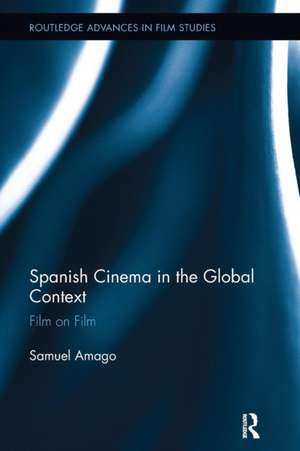Spanish Cinema in the Global Context: Film on Film: Routledge Advances in Film Studies
Autor Samuel Amagoen Limba Engleză Paperback – 8 noi 2016
| Toate formatele și edițiile | Preț | Express |
|---|---|---|
| Paperback (1) | 402.66 lei 6-8 săpt. | |
| Taylor & Francis – 8 noi 2016 | 402.66 lei 6-8 săpt. | |
| Hardback (1) | 1058.43 lei 6-8 săpt. | |
| Taylor & Francis – 23 mai 2013 | 1058.43 lei 6-8 săpt. |
Din seria Routledge Advances in Film Studies
-
 Preț: 319.20 lei
Preț: 319.20 lei -
 Preț: 310.14 lei
Preț: 310.14 lei -
 Preț: 349.02 lei
Preț: 349.02 lei -
 Preț: 301.93 lei
Preț: 301.93 lei -
 Preț: 310.65 lei
Preț: 310.65 lei -
 Preț: 310.85 lei
Preț: 310.85 lei -
 Preț: 313.47 lei
Preț: 313.47 lei -
 Preț: 372.42 lei
Preț: 372.42 lei -
 Preț: 356.77 lei
Preț: 356.77 lei -
 Preț: 349.10 lei
Preț: 349.10 lei - 18%
 Preț: 1106.81 lei
Preț: 1106.81 lei -
 Preț: 416.06 lei
Preț: 416.06 lei - 18%
 Preț: 1116.02 lei
Preț: 1116.02 lei -
 Preț: 449.05 lei
Preț: 449.05 lei -
 Preț: 388.85 lei
Preț: 388.85 lei - 18%
 Preț: 1112.21 lei
Preț: 1112.21 lei - 18%
 Preț: 1112.34 lei
Preț: 1112.34 lei - 18%
 Preț: 1106.81 lei
Preț: 1106.81 lei - 18%
 Preț: 1106.85 lei
Preț: 1106.85 lei -
 Preț: 382.86 lei
Preț: 382.86 lei -
 Preț: 475.65 lei
Preț: 475.65 lei -
 Preț: 441.20 lei
Preț: 441.20 lei -
 Preț: 387.31 lei
Preț: 387.31 lei - 18%
 Preț: 729.62 lei
Preț: 729.62 lei - 18%
 Preț: 1056.95 lei
Preț: 1056.95 lei - 18%
 Preț: 1058.43 lei
Preț: 1058.43 lei - 18%
 Preț: 1161.62 lei
Preț: 1161.62 lei - 30%
 Preț: 848.15 lei
Preț: 848.15 lei - 18%
 Preț: 1109.99 lei
Preț: 1109.99 lei - 18%
 Preț: 1054.43 lei
Preț: 1054.43 lei -
 Preț: 398.48 lei
Preț: 398.48 lei - 18%
 Preț: 1117.43 lei
Preț: 1117.43 lei - 18%
 Preț: 1115.51 lei
Preț: 1115.51 lei - 18%
 Preț: 1114.30 lei
Preț: 1114.30 lei - 18%
 Preț: 1053.16 lei
Preț: 1053.16 lei - 18%
 Preț: 1057.75 lei
Preț: 1057.75 lei - 30%
 Preț: 820.32 lei
Preț: 820.32 lei - 18%
 Preț: 1112.34 lei
Preț: 1112.34 lei - 18%
 Preț: 1057.75 lei
Preț: 1057.75 lei - 18%
 Preț: 1117.43 lei
Preț: 1117.43 lei
Preț: 402.66 lei
Nou
Puncte Express: 604
Preț estimativ în valută:
77.05€ • 80.73$ • 63.69£
77.05€ • 80.73$ • 63.69£
Carte tipărită la comandă
Livrare economică 11-25 aprilie
Preluare comenzi: 021 569.72.76
Specificații
ISBN-13: 9781138243354
ISBN-10: 1138243353
Pagini: 200
Ilustrații: 40
Dimensiuni: 152 x 229 x 11 mm
Greutate: 0.45 kg
Ediția:1
Editura: Taylor & Francis
Colecția Routledge
Seria Routledge Advances in Film Studies
Locul publicării:Oxford, United Kingdom
ISBN-10: 1138243353
Pagini: 200
Ilustrații: 40
Dimensiuni: 152 x 229 x 11 mm
Greutate: 0.45 kg
Ediția:1
Editura: Taylor & Francis
Colecția Routledge
Seria Routledge Advances in Film Studies
Locul publicării:Oxford, United Kingdom
Public țintă
Postgraduate and UndergraduateCuprins
Introduction Part 1: Art, Commerce, and Reflexivity in Contemporary Spanish Cinema 1. Historical Reflection and National Allegory in La mala educación ("Bad Education") (Pedro Almodóvar, 2004) and Los abrazos rotos ("Broken Embraces") (Pedro Almodóvar, 2009) 2. Mapping the Global Popular in 800 balas ("800 Bullets") (Álex de la Iglesia, 2002) and Hot Fuzz (Edgar Wright, 2007) 3. Reflexivity as Media Critique in Tesis ("Thesis") (Alejandro Amenábar, 1996) Part 2: Spanish National Histories on Film 4. Processing the Past in Soldados de Salamina ("Soldiers of Salamis") (David Trueba, 2003) 5. The Ends of Historical Memory in Pa negre ("Black Bread") (Agustí Villaronga, 2010) 6. Migration and Meta-melodrama in Poniente ("West") (Chus Gutiérrez, 2002) and Un Franco, 14 pesetas ("One Franc, 14 Pesetas") (Carlos Iglesias, 2006) Part 3: Spain in/and the Global Cinema 7. Mapping Cultural Tourism in Vicky Cristina Barcelona (Woody Allen, 2008) and The Limits of Control (Jim Jarmusch, 2009) Conclusion.
Notă biografică
Samuel Amago is Associate Professor of Spanish at the University of North Carolina at Chapel Hill, USA.
Recenzii
'Spanish Cinema in the Global Context is a much-needed contribution to the already vast body of Spanish film criticism because it moves beyond a national framework and incorporates examples of and references to many film traditions, thus questioning the appropriateness of the term “national.” The approach is fresh and focused on specific questions of filmic technique and distribution. Scholars and students of Spanish and international film, cultural studies, and globalization will find Amago’s volume a worthy and necessary read.' --Kathryn Everly, in Symposium: A Quarterly Journal in Modern Literatures (2016)
Descriere
Focusing on films in the contemporary Spanish context that in some way reflect back on themselves and the processes of their own production, that purposefully blur the distinction between reality and fiction, or that draw attention to the various modes of cinematic exhibition and reception, Amago proposes ways in which these vocabularies can be employed to understand Spanish national cinemas today as imbedded within a dynamic global system.
